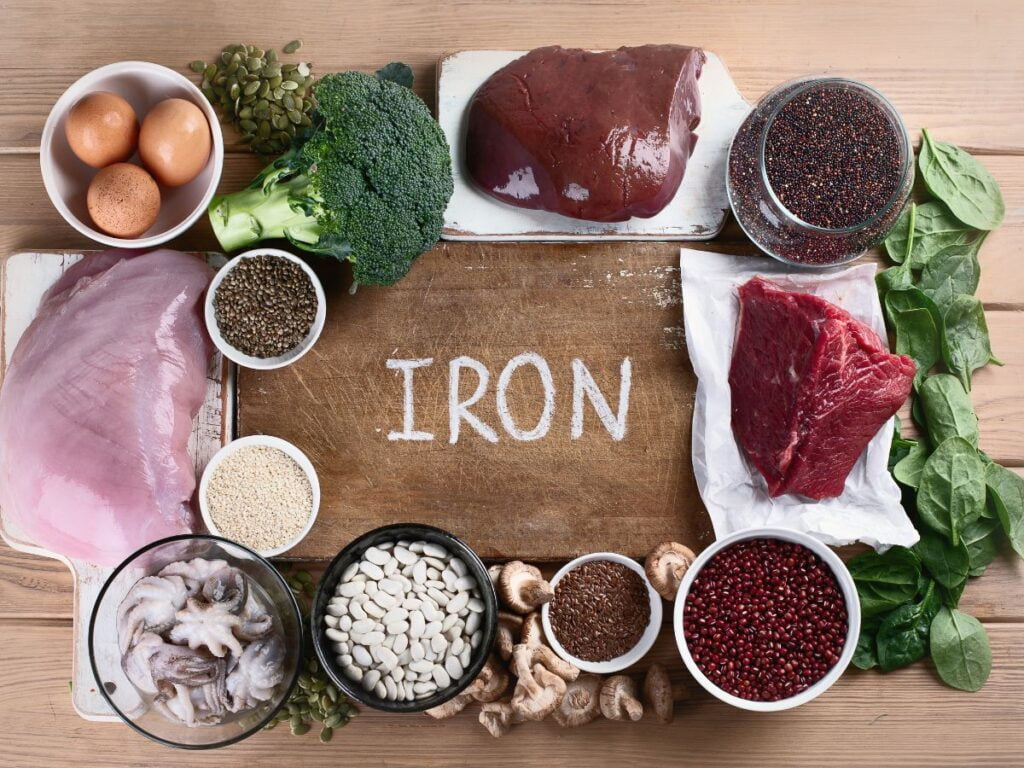Symptoms of Iron Deficiency in the Body
Iron deficiency symptoms in the body are common conditions that affects millions of people worldwide. It occurs when your body doesn’t have enough iron to produce haemoglobin, which is essential for carrying oxygen in your blood. Without enough iron, your body can’t make enough healthy red blood cells, leading to symptoms that can range from mild to severe. Recognizing the signs of iron deficiency is important for maintaining overall health and well-being.

Iron is an Essential Mineral
Iron is an essential mineral that plays a crucial role in maintaining the health of our hair and improving our overall physical well-being. While some hair loss is normal, excessive shedding may indicate a deficiency in vitamins, including iron. Additionally, fatigue and swelling of the tongue can also be counted in the iron deficiency symtoms in the body.
Many vitamin deficiencies can be addressed through a balanced diet rich in fruits and vegetables, which provide essential nutrients for both physical and mental health.
If you suspect you may be one who is facing following Iron deficiency symptoms in the body:
Hair Loss:
While losing a few hundred hairs daily is typical, excessive shedding and slow regrowth could signal an iron deficiency. Adequate iron levels are necessary for proper oxygenation of hair follicles, and lack thereof can lead to hair loss.
Extreme Fatigue:
Iron deficiency often manifests as profound fatigue due to the body’s struggle to deliver oxygen to cells. This can significantly impact energy levels, leaving individuals feeling lethargic and weak.
Recurring Infections:
Iron plays a critical role in supporting a healthy immune system. Deficiency in iron can compromise the body’s ability to fight off infections, leading to recurrent illnesses.
Swelling in the Tongue:
Changes in the tongue, such as swelling or pain, may indicate iron deficiency. Cracks at the corners of the mouth are also common symptoms associated with low iron levels.
Yellowing of the Skin:
Iron deficiency can result in a yellowish tint to the skin due to decreased hemoglobin levels. This discoloration may be noticeable regardless of one’s natural skin tone.
Restless Legs Syndrome:
Some individuals with iron deficiency experience restless legs syndrome, characterized by an uncontrollable urge to move the legs. This condition can disrupt sleep patterns and cause discomfort.
Cravings for Non-Food Items:
Iron-deficient individuals may develop cravings for non-food items like clay or chalk—a condition known as pica. However, consuming such substances can hinder iron absorption and pose health risks.

Can iron deficiency in the body affect mental health?
Yes, iron deficiency can impact mental health in several ways, including:
- Difficulty concentrating or poor cognitive function.
- Irritability or mood swings.
- Depression or anxiety.
Who is at risk of developing iron deficiency in the body?
Anyone can develop iron deficiency, but certain factors can increase your risk, including:
- Blood loss due to menstruation, pregnancy, or childbirth.
- Inadequate dietary intake of iron-rich foods or poor absorption of iron.
- Chronic diseases like inflammatory bowel disease (IBD) or chronic kidney disease (CKD) that can affect iron absorption or utilization.
- Vegetarian or vegan diets that may not provide enough heme iron, the type of iron most easily absorbed by the body.
- Infants, young children, and adolescents who have increased iron needs for growth and development.
When should I see a doctor if I suspect iron deficiency?
If you experience any symptoms of iron deficiency, especially if they persist or worsen over time, it’s essential to see a healthcare professional for evaluation and testing. A doctor can perform blood tests to check your iron levels and recommend appropriate treatment based on the results.
How is iron deficiency in the body treated?
Treatment for iron deficiency typically involves increasing iron intake through dietary changes and/or iron supplementation. Depending on the severity of the deficiency and the underlying cause, your doctor may recommend iron supplements and monitor your progress through follow-up blood tests.
Are there any complications associated with untreated iron deficiency?
Yes, if left untreated, iron deficiency can lead to complications such as:
- Iron deficiency anemia: A severe deficiency of iron that results in low levels of hemoglobin and fewer red blood cells.
- Impaired cognitive function: Chronic iron deficiency can affect cognitive development in infants and children and impair cognitive function in adults.
- Increased risk of infections: Iron deficiency can weaken the immune system, making you more susceptible to infections.
- Pregnancy complications: Iron deficiency during pregnancy can increase the risk of preterm birth, low birth weight, and maternal and fetal complications.
 How can iron deficiency be prevented?
How can iron deficiency be prevented?
To help prevent iron deficiency, you can:
- Eat a balanced diet rich in iron-containing foods such as lean meats, poultry, fish, beans, lentils, tofu, spinach, and fortified cereals.
- Pair iron-rich foods with vitamin C-rich foods like citrus fruits, tomatoes, and bell peppers to enhance iron absorption.
- Avoid drinking tea or coffee with meals, as they can inhibit iron absorption.
- Consider taking iron supplements if you are at risk of deficiency or have been diagnosed with iron deficiency anemia.
Can I overdose on iron supplements?
Yes, it is possible to overdose on iron supplements, which can lead to iron toxicity and serious health problems. Always follow your doctor’s instructions regarding the dosage and duration of iron supplementation, and never take more than the recommended amount without medical supervision.
Is there anything else I should know about iron deficiency?
It’s essential to be aware of the symptoms of iron deficiency and seek medical attention if you experience them. Iron deficiency can have significant implications for your health and well-being, but it is treatable and manageable with proper diagnosis and treatment. If you have any concerns about your iron levels or overall health, don’t hesitate to talk to your healthcare provider for guidance and support.
Are there any dietary factors that can affect iron absorption?
Yes, several dietary factors can influence iron absorption, including:
- Phytates: Found in whole grains, legumes, nuts, and seeds, phytates can inhibit iron absorption. Soaking, sprouting, or fermenting these foods can help reduce phytate levels.
- Tannins: Present in tea, coffee, and some herbal infusions, tannins can interfere with iron absorption. Consuming these beverages between meals rather than with iron-rich foods can minimize this effect.
- Calcium: High calcium intake, particularly from dairy products, can inhibit iron absorption. It’s best to consume calcium-rich foods separately from iron-rich foods.
- Oxalates: Found in spinach, beet greens, and rhubarb, oxalates can bind to iron and reduce its absorption. Cooking these foods can help decrease oxalate levels and improve iron absorption.
Can iron deficiency affect athletic performance?
Yes, iron deficiency can negatively impact athletic performance due to its role in oxygen transport and energy metabolism. Athletes with iron deficiency may experience decreased endurance, increased fatigue, and reduced exercise tolerance. It’s essential for athletes to maintain adequate iron levels through a balanced diet and regular monitoring of iron status.
Can certain medications affect iron absorption?
Yes, some medications can interfere with iron absorption or increase iron loss, including:
- Proton pump inhibitors (PPIs) and antacids: Used to treat acid reflux and ulcers, PPIs and antacids can reduce stomach acid production, impairing iron absorption.
- Nonsteroidal anti-inflammatory drugs (NSAIDs): NSAIDs like ibuprofen and aspirin can cause gastrointestinal bleeding, leading to iron loss.
- Certain antibiotics: Antibiotics like tetracyclines and quinolones can bind to iron and reduce its absorption when taken together.
Is there a link between iron deficiency and hair loss?
Yes, iron deficiency can contribute to hair loss or thinning, although the exact mechanism is not fully understood. Iron is essential for maintaining healthy hair follicles and promoting hair growth. Addressing iron deficiency through dietary changes or supplementation may help improve hair health in individuals experiencing hair loss related to low iron levels.
Can iron deficiency cause digestive issues?
While iron deficiency itself may not directly cause digestive issues, underlying conditions that lead to iron deficiency, such as gastrointestinal bleeding or malabsorption disorders, can result in digestive symptoms like abdominal pain, bloating, diarrhea, or constipation. It’s important to identify and address the underlying cause of iron deficiency to alleviate digestive symptoms and restore overall health.
Is iron deficiency more common in certain demographic groups?
Yes, iron deficiency may be more prevalent in certain demographic groups, including:
- Women of childbearing age: Due to menstrual blood loss and increased iron requirements during pregnancy.
- Infants and young children: Rapid growth and development increase iron needs during early childhood.
- Pregnant individuals: Increased blood volume and fetal iron requirements during pregnancy can lead to higher iron needs.
- Vegetarians and vegans: Plant-based diets may provide less bioavailable iron compared to animal sources, increasing the risk of deficiency if not adequately supplemented.
- Individuals with certain medical conditions: Chronic diseases like celiac disease, Crohn’s disease, or kidney failure can impair iron absorption or utilization, leading to deficiency.
Can iron deficiency affect sleep patterns?
Yes, iron deficiency has been associated with sleep disturbances, including restless legs syndrome (RLS) and periodic limb movement disorder (PLMD). RLS causes uncomfortable sensations in the legs and an irresistible urge to move them, often leading to difficulty falling asleep or staying asleep. Addressing iron deficiency may help alleviate RLS symptoms and improve sleep quality.
Is there a relationship between iron deficiency and heart health?
Yes, iron deficiency has been linked to an increased risk of cardiovascular complications, including heart failure, arrhythmias, and ischemic heart disease. Iron is essential for maintaining normal cardiac function and oxygen delivery to tissues. Chronic iron deficiency can lead to structural and functional changes in the heart, contributing to cardiovascular disease development. Managing iron deficiency may help reduce the risk of cardiovascular complications and promote heart health.
 Can iron deficiency affect pregnancy outcomes?
Can iron deficiency affect pregnancy outcomes?
Yes, iron deficiency during pregnancy can have adverse effects on both maternal and fetal health, including:
- Increased risk of preterm birth: Iron deficiency has been associated with an elevated risk of preterm labor and delivery.
- Low birth weight: Insufficient iron intake during pregnancy can impair fetal growth and development, leading to low birth weight.
- Maternal complications: Iron deficiency anemia during pregnancy can increase the risk of maternal complications such as preeclampsia, postpartum hemorrhage, and maternal mortality.
- Fetal complications: Iron deficiency can impair fetal iron stores and increase the risk of iron deficiency anemia in newborns, which may have long-term consequences for their health and development.
Can iron deficiency be a sign of an underlying health condition?
Yes, iron deficiency can sometimes be a symptom of an underlying health condition, such as gastrointestinal bleeding, inflammatory bowel disease (IBD), chronic kidney disease (CKD), or certain cancers. It’s essential to investigate the underlying cause of iron deficiency through thorough medical evaluation and diagnostic testing to ensure appropriate management and treatment of both the deficiency and the underlying condition.
Are there any dietary supplements that can interfere with iron absorption?
Yes, some dietary supplements may interfere with iron absorption if taken together. For example:
- Calcium supplements: High doses of calcium can inhibit iron absorption when taken simultaneously.
- Zinc supplements: Zinc competes with iron for absorption in the intestines, so taking large amounts of zinc supplements may reduce iron absorption.
- Magnesium supplements: Magnesium can interfere with iron absorption if taken in high doses or in certain forms.
- Vitamin E supplements: Excessive intake of vitamin E supplements may impair iron absorption, although the evidence is limited.
Can iron deficiency symptoms in the body affect mental health in children and adolescents?
Yes, iron deficiency can have adverse effects on mental health and cognitive development in children and adolescents. Iron is essential for brain development and function, and inadequate iron intake during critical periods of growth and development can lead to cognitive impairments, learning difficulties, and behavioral problems. Addressing iron deficiency early is crucial for promoting optimal cognitive and psychological well-being in young individuals.
How can I incorporate more iron-rich foods into my diet?
You can increase your intake of iron-rich foods by including a variety of sources in your diet, such as:
- Lean meats: Beef, pork, poultry, and organ meats like liver are excellent sources of heme iron, which is more readily absorbed by the body.
- Seafood: Shellfish like oysters, clams, and mussels are rich in heme iron, while fish like salmon and tuna provide both heme and non-heme iron.
- Beans and legumes: Lentils, chickpeas, black beans, and soybeans are nutritious plant-based sources of iron.
- Fortified cereals and grains: Many breakfast cereals, bread, and pasta products are fortified with iron to enhance their nutritional value.
- Leafy greens: Spinach, kale, and Swiss chard are packed with non-heme iron, along with other essential nutrients.
- Nuts and seeds: Almonds, cashews, pumpkin seeds, and sunflower seeds are healthy snacks rich in iron and other beneficial nutrients.
Can iron deficiency symptoms in the body affect fertility in women?
Yes, iron deficiency may impact fertility in women due to its effects on menstrual health and reproductive function. Chronic iron deficiency can lead to irregular menstrual cycles, anovulation (lack of ovulation), and decreased fertility. Adequate iron intake is essential for maintaining reproductive health and optimizing fertility outcomes in women of childbearing age. If you’re trying to conceive and suspect iron deficiency, consult with a healthcare professional for evaluation and guidance.
Is iron deficiency symptoms in the body more common in certain ethnic or racial groups?
Yes, some ethnic and racial groups may have a higher prevalence of iron deficiency due to various factors, including dietary patterns, cultural practices, and genetic predispositions. For example, individuals of African, Hispanic, or Asian descent may be at increased risk of iron deficiency due to dietary preferences, genetic variants affecting iron absorption or metabolism, or cultural factors influencing iron intake. It’s important to consider these factors when assessing iron status and addressing deficiencies in diverse populations.
The above valuable insights into the symptoms, causes, and consequences of iron deficiency, helping individuals better understand this common health condition and take proactive steps to maintain optimal iron levels and overall well-being. If you have any further questions or concerns about iron deficiency or related topics, don’t hesitate to consult with a healthcare provider for personalized advice and support.




